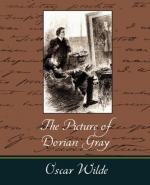lay a mandolin and an apple. There were large
green rosettes upon her little pointed shoes.
He knew her life, and the strange stories that were
told about her lovers. Had he something of her
temperament in him? These oval, heavy-lidded
eyes seemed to look curiously at him. What of
George Willoughby, with his powdered hair and fantastic
patches? How evil he looked! The face was
saturnine and swarthy, and the sensual lips seemed
to be twisted with disdain. Delicate lace ruffles
fell over the lean yellow hands that were so overladen
with rings. He had been a macaroni of the eighteenth
century, and the friend, in his youth, of Lord Ferrars.
What of the second Lord Beckenham, the companion of
the Prince Regent in his wildest days, and one of
the witnesses at the secret marriage with Mrs. Fitzherbert?
How proud and handsome he was, with his chestnut
curls and insolent pose! What passions had he
bequeathed? The world had looked upon him as
infamous. He had led the orgies at Carlton House.
The star of the Garter glittered upon his breast.
Beside him hung the portrait of his wife, a pallid,
thin-lipped woman in black. Her blood, also,
stirred within him. How curious it all seemed!
And his mother with her Lady Hamilton face and her
moist, wine-dashed lips—he knew what he
had got from her. He had got from her his beauty,
and his passion for the beauty of others. She
laughed at him in her loose Bacchante dress.
There were vine leaves in her hair. The purple
spilled from the cup she was holding. The carnations
of the painting had withered, but the eyes were still
wonderful in their depth and brilliancy of colour.
They seemed to follow him wherever he went.
Yet one had ancestors in literature as well as in
one’s own race, nearer perhaps in type and temperament,
many of them, and certainly with an influence of which
one was more absolutely conscious. There were
times when it appeared to Dorian Gray that the whole
of history was merely the record of his own life, not
as he had lived it in act and circumstance, but as
his imagination had created it for him, as it had
been in his brain and in his passions. He felt
that he had known them all, those strange terrible
figures that had passed across the stage of the world
and made sin so marvellous and evil so full of subtlety.
It seemed to him that in some mysterious way their
lives had been his own.
The hero of the wonderful novel that had so influenced
his life had himself known this curious fancy.
In the seventh chapter he tells how, crowned with
laurel, lest lightning might strike him, he had sat,
as Tiberius, in a garden at Capri, reading the shameful
books of Elephantis, while dwarfs and peacocks strutted
round him and the flute-player mocked the swinger
of the censer; and, as Caligula, had caroused with
the green-shirted jockeys in their stables and supped
in an ivory manger with a jewel-frontleted horse; and,
as Domitian, had wandered through a corridor lined




